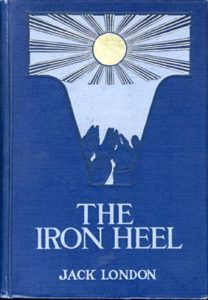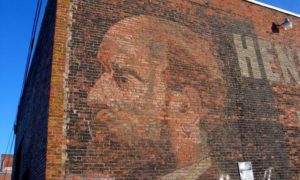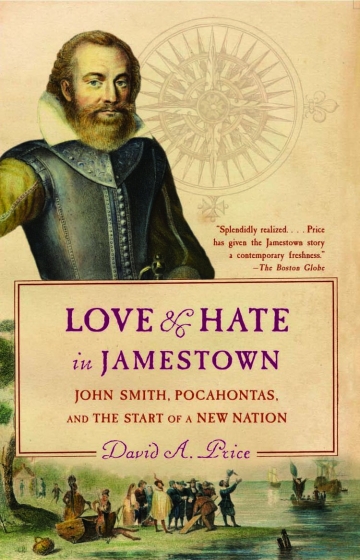
Join us in celebrating Income Tax Appreciation Day. This page will be updated with specifics of our celebration as we figure out how best to do it.
 Bob Matter’s Political Economy Book Club is reading Jack London’s dystopian novel The Iron Heel. On June 25 we’ll discuss chapters 1-13, and on July 23 chapters 14-25. This 1908 text is available free from Project Gutenberg, in hardcopy from some public libraries, or as an audiobook. You can buy used hardcopies for < $10 from several vendors.
Bob Matter’s Political Economy Book Club is reading Jack London’s dystopian novel The Iron Heel. On June 25 we’ll discuss chapters 1-13, and on July 23 chapters 14-25. This 1908 text is available free from Project Gutenberg, in hardcopy from some public libraries, or as an audiobook. You can buy used hardcopies for < $10 from several vendors.
We’ll meet at the East Loop location of Bridgeport Coffeehouse, 73 E Jackson Blvd.
 Bob Matter’s Political Economy Book Club concludes its discussion of Jack London’s dystopian novel The Iron Heel. On July 23 we treat chapters 14-25.
Bob Matter’s Political Economy Book Club concludes its discussion of Jack London’s dystopian novel The Iron Heel. On July 23 we treat chapters 14-25.
We’ll meet at the east loop location of Bridgeport Coffee, 73 E Jackson.

Henry George was born in Philadelphia on September 2, 1839, so we’ll celebrate his 180th birthday on Labor Day. As usual, the event will be in a south Evanston back yard, beginning when we get some shade around 3:00, and continuing at least until dark (We do have indoor space in case of rain or extreme heat).
This is a potluck; bring something if you can and let Chuck know about it. Grilled sausages and some vegan stuff will be provided. All alumni, friends, and prospective students of the School are welcome but you must let us know you’re coming. Expect to find some soft drinks, beer, maybe wine if somebody brings some.
While the event is free, monetary donations will be gratefully accepted.

Decades before Wealth of Nations, Adam Smith wrote what he seems to have considered a superior work, Theory of Moral Sentiments. He wrote:
How selfish soever man may be supposed, there are evidently some principles in his nature, which interest him in the fortune of others, and render their happiness necessary to him, though he derives nothing from it except the pleasure of seeing it.
Wikipedia asserts:
Smith critically examines the moral thinking of his time, and suggests that conscience arises from dynamic and interactive social relationships through which people seek “mutual sympathy of sentiments.”[74] His goal in writing the work was to explain the source of mankind’s ability to form moral judgement, given that people begin life with no moral sentiments at all. Smith proposes a theory of sympathy, in which the act of observing others and seeing the judgements they form of both others and oneself makes people aware of themselves and how others perceive their behaviour.
The Theory of Moral Sentiments has been printed in numerous editions, and is also available free on line. Smith revised the book throughout his lifetime; it’s best to avoid the first edition, and choose one published after his death in 1790.
In this session we’ll discuss parts 1-3 of the book, taking up parts 4-7 on November 20,
 “In 1606, approximately 105 British colonists sailed to America, seeking gold and a trade route to the Pacific. Instead, they found disease, hunger, and hostile natives. Ill prepared for such hardship, the men responded with incompetence and infighting. Only the leadership of Captain John Smith averted doom….” (from the book jacket).
“In 1606, approximately 105 British colonists sailed to America, seeking gold and a trade route to the Pacific. Instead, they found disease, hunger, and hostile natives. Ill prepared for such hardship, the men responded with incompetence and infighting. Only the leadership of Captain John Smith averted doom….” (from the book jacket).

Henry George was born in Philadelphia on September 2, 1839, so we’ll celebrate his 185th birthday on Labor Day. As usual, the event will be in a south Evanston back yard, beginning when we get some shade around 3:00, and continuing at least until dark (We do have indoor space in case of rain or extreme heat).
This is a potluck; bring something if you can and let Chuck know about it. Grilled sausages and some vegan stuff will be provided. All alumni, friends, and prospective students of the School are welcome but you must let us know you’re coming. Expect to find some soft drinks, beer, maybe wine if somebody brings some.
While the event is free, monetary donations to the School will be gratefully accepted.

Henry George was born in Philadelphia on September 2, 1839, so we’ll celebrate his 185th birthday on Labor Day. As usual, the event will be in a south Evanston back yard, beginning when we get some shade around 3:00, and continuing at least until dark (We do have indoor space in case of rain or extreme heat).
This is a potluck; bring something if you can and let Chuck know about it. Grilled sausages and some vegan stuff will be provided. All alumni, friends, and prospective students of the School are welcome but you must let us know you’re coming. Expect to find some soft drinks, beer, maybe wine if somebody brings some.
While the event is free, monetary donations to the School will be gratefully accepted.

Henry George was born in Philadelphia on September 2, 1839, so we’ll celebrate his 186th birthday a day early, on Labor Day. As usual, the event will be in a south Evanston back yard, beginning when we get some shade around 3:00, and continuing at least until dark (We do have indoor space in case of rain or extreme heat).
There is no charge for this event but it’s a potluck; bring something if you can and let Chuck know about it. Grilled sausages and some vegan stuff will be provided. All alumni, friends, and prospective students of the School are welcome but you must let us know you’re coming. Expect to find some liquids including beer, maybe wine and soft drinks if somebody brings some.

